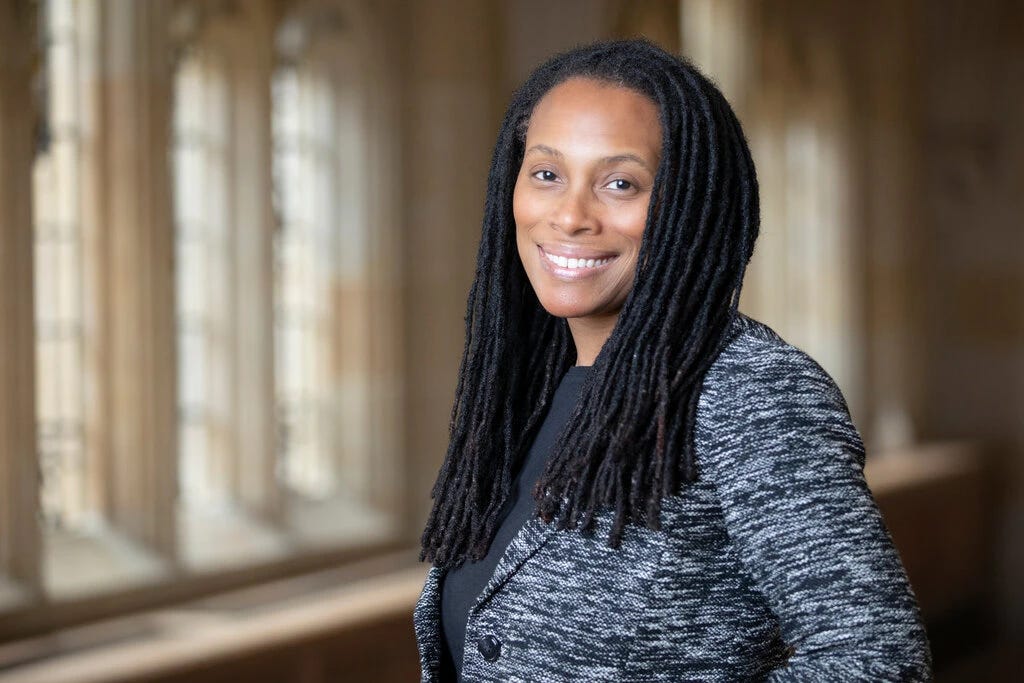Anti-Black racism, healthcare, and dermatology
In an interview, Dr. OmiSoore Dryden, the Chair in Black Canadian Studies at Dalhousie University, Halifax, discusses anti-Black racism in healthcare (900 words, 3.6 min)
Skin Spectrum Weekly is proud to announce the first dermatology conference of its kind. The Indigenous Skin Spectrum Summit is a special session of Skin Spectrum Summit held on March 18 and 20, addressing Canada's Indigenous community's specific treatment needs. Click here to learn more and register.
When OmiSoore Dryden, Ph.D., began her appointment as the James R. Johnston Chair in Black Canadian Studies at Dalhousie University in Halifax in May 2019, it was before both the murder of George Floyd and the Covid-19 pandemic.
“A lot of people said, ‘what do Black studies have to do with medicine?’ They just did not understand that connection,” said Dr. Dryden in an interview with Skin Spectrum Weekly. Part of her mission in her new role has been to detail and outline the history of anti-Black racism in medicine, which she did in a recent lecture titled “Black Lives Matter and Healthcare.”
Dr. Dryden is the first chair from the faculty of medicine to hold the national senior research chair position, which rotates through faculties every six years. She earned her Ph.D. in Social Justice Education and is an Associate Professor in the Department of Community Health & Epidemiology at Dalhousie.
This week, Dr. Dryden spoke with Skin Spectrum Weekly about scientific racism in Canada, how access to melanoma screening for marginalized communities can be improved, and how anti-Black racism is affecting the rollout of the Covid-19 vaccine.
Skin Spectrum Weekly: Studies have shown people of colour are more likely to die from melanoma due to delay in detection or presentation. What can be done to improve access to this type of treatment in marginalized communities?
Dr. Dryden: We need to understand the intersection between social determinants of health and health diagnoses. I have said to physicians that you need to think about anti-Black racism as a comorbidity. What we do know from the studies is that having to confront and engage, and be subjected to anti-Black racism has a physiological effect on the body. Anti-Black racism makes it more difficult to move through the medical system. Somehow, it is like [clinicians] forget all of the warning signs of what these conditions are when Black people show up. Physicians need to actually engage in continuing professional development that trains them in the areas of Black health—the training that they did not get when they were going to medical school. It is incumbent upon them to make sure they are capable of actually treating Black patients.
SSW: There was a recent study that showed that there is an absence of images of skin colour in studies of Covid-19 skin manifestations. How should dermatologists and researchers react to this finding?
Dr. Dryden: They should be outraged that this has been allowed to go on for so long. Not outraged that the finding came out, but that they let their profession down by not identifying this lack sooner and then working quickly and emphatically to adjust it. I think of the young, Black person in the UK who built the database that identifies what skin conditions look like on Black people or on darker skin tones. He said, “I’m just going to do that because the profession seems to have relinquished their responsibility to provide that information.” Once people see this data, they can be a little sheepish, like, why didn't they think of doing this? Why didn't they put this together? Why didn't they work more collaboratively? This is the work that needs to have funding. This is the work that needs to be read across all medical schools and by all of the physicians who are teaching around dermatology. It is an urgency.
SSW: How do you think anti-Black racism will, or currently is, affecting the rollout of the Covid-19 vaccine for Black populations in Canada?
Dr. Dryden: Vaccine hesitancy really is embedded in the inter-generational trauma around anti-Black racism and the growing and continuing mistrust that Black people generally have of the healthcare system. Public health agencies across the country and in North America are in a bit of a quagmire because they know that Black people are a vulnerable population when it comes to Covid-19. However, the same agencies that tell Black people they need to get the vaccine and stop being non-compliant have done nothing to address the history of anti-Black racism in the health care system.
SSW: Is current medical training in Canada meeting the challenges needed to ensure cultural competence among health care practitioners?
Dr. Dryden: Absolutely not. There are universities in Canada that still have zero Black or Indigenous people in the incoming medical class. Then, when there are Black people, it is usually just one or two, and there is always some assumption from classmates that somehow, they are not qualified enough to be in medical school. We are still at a point in 2021, where there may be some conscious effort to deliberately provide information on Indigenous health, but zero thought that there should be something on Black health. There is no question on the qualifying exams in the Medical Council of Canada that specifically asks medical students who are now taking the exam to be a physician, anything about Black people and their health. To touch on dermatology: examples of skin conditions are primarily on White people. Being unable to identify skin conditions or skin issues on people with darker skin means that they are diagnosed at a later stage with worse outcomes, which is a direct reflection of systemic racism.
SSW: What has been the lasting effects of the underfunded, understaffed, overcrowded, and racially segregated “Indian hospitals” that existed in Canada for years?
Dr. Dryden: Indigenous communities continue, generally, to be very suspicious and cautious around Western medicine. In October, in a hospital in Quebec, a woman named Joyce Echaquan filmed herself, as she lay dying, asking for help. In the background, you could hear the nurses laughing, calling her racial slurs and other things, and that video went viral. You can hear the nurses perpetuating these disparaging stereotypes that directly came out of colonialism, were perpetrated in Indian hospitals and residential schools, and continue to exist in medical care today. It is a systemic problem, although people like to consider it just an individual problem. In Joyce's case, they consider it an individual problem of those three nurses instead of a systemic problem, a climate, a culture that allows those three nurses to have the conversation while on camera.
FROM THE LITERATURE ON RACISM IN MEDICINE
Time to dismantle systemic anti-Black racism in medicine in Canada
On January 21, the Canadian Medical Association Journal released an article written by Dr. OmiSoore Dryden and Dr. Onye Nnorom that focused on Anti-Black racism in medicine. The paper dispels several myths based on biological racism and examines a way forward.
Antibiotic use among twelve Canadian First Nations communities: a retrospective chart review of skin and soft tissue infections
A study released last year found a high prevalence of antibiotic use and skin and soft tissue infections in Indigenous communities in Canada. The authors of the study said that this is likely due to limited access to healthcare due to the geographical remoteness of the population.
Skin colour in dermatology textbooks: An updated evaluation and analysis
A research letter published this month in the Journal of the American Academy of Dermatology provided an updated dermatology textbook evaluation. The study found that only 11.5 per cent of images found in the analyzed textbooks were Fitzpatrick skin types V and VI.
AT THE INTERSECTION OF SKIN AND SOCIETY
According to a recent article in the New York Times, U.S. President Joe Biden appointed Dr. Marcella Nunez-Smith as the head of the administration’s task force on health equity. Dr. Nunez-Smith grew up in the United States Virgin Islands and is an associate professor of internal medicine, public health and management at Yale University. In the article, Dr. Nunez-Smith (pictured below) talked about her mission. “Making sure communities hardest hit by the pandemic have access to safe, effective vaccines remains a priority,” Dr. Nunez-Smith said. But “what’s needed to ensure equity in the recovery is not limited to health and health care. We have to have conversations about housing stability and food security and educational equity, and pathways to economic opportunities and promise,” she said. Read the full article here.
This Week
February is Black History Month
Thursday, Feb. 4 World Cancer Day
Wednesday, Feb. 10 National Pharmaceutical Congress Winter Webinar
Something to think about during the week ahead…
Next Week
Dr. Maha Dutil discusses treatment options and emerging treatments for atopic dermatitis.
Thank you to our panellists and delegates for making Skin Spectrum Summit 2020 a great success. Conference highlights will soon be posted to the Skin Spectrum website. As always, we welcome your questions and comments on topics in Ethnodermatology.








